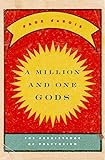A Million and One Gods : The Persistence of Polytheism / Page duBois.
Material type: TextPublisher: Cambridge, MA : Harvard University Press, [2014]Copyright date: ©2014Description: 1 online resource (207 p.)Content type:
TextPublisher: Cambridge, MA : Harvard University Press, [2014]Copyright date: ©2014Description: 1 online resource (207 p.)Content type: - 9780674728837
- 9780674369122
- 201/.4 23
- BL217 .D83 2014eb
- online - DeGruyter
- Issued also in print.
| Item type | Current library | Call number | URL | Status | Notes | Barcode | |
|---|---|---|---|---|---|---|---|
 eBook
eBook
|
Biblioteca "Angelicum" Pont. Univ. S.Tommaso d'Aquino Nuvola online | online - DeGruyter (Browse shelf(Opens below)) | Online access | Not for loan (Accesso limitato) | Accesso per gli utenti autorizzati / Access for authorized users | (dgr)9780674369122 |
Browsing Biblioteca "Angelicum" Pont. Univ. S.Tommaso d'Aquino shelves, Shelving location: Nuvola online Close shelf browser (Hides shelf browser)
Frontmatter -- Contents -- Introduction -- CHAPTER ONE. The Prejudice against Polytheism -- CHAPTER TWO. Greeks, Romans, and Their Many Gods -- CHAPTER THREE. The Polytheism of Monotheism -- CHAPTER FOUR. The Politics of Polytheism -- Epilogue -- NOTES -- Acknowledgments -- Index
restricted access online access with authorization star
http://purl.org/coar/access_right/c_16ec
Many people worship not just one but many gods. Yet a relentless prejudice against polytheism denies legitimacy to some of the world's oldest and richest religious traditions. In her examination of polytheistic cultures both ancient and contemporary--those of Greece and Rome, the Bible and the Quran, as well as modern India--Page duBois refutes the idea that the worship of multiple gods naturally evolves over time into the "higher" belief in a single deity. In A Million and One Gods, she shows that polytheism has endured intact for millennia even in the West, despite the many hidden ways that monotheistic thought continues to shape Western outlooks. In English usage, the word "polytheism" comes from the seventeenth-century writings of Samuel Purchas. It was pejorative from the beginning--a word to distinguish the belief system of backward peoples from the more theologically advanced religion of Protestant Christians. Today, when monotheistic fundamentalisms too often drive people to commit violent acts, polytheism remains a scandalous presence in societies still oriented according to Jewish, Christian, and Muslim beliefs. Even in the multicultural milieus of twenty-first-century America and Great Britain, polytheism finds itself marginalized. Yet it persists, perhaps because polytheism corresponds to unconscious needs and deeply held values of tolerance, diversity, and equality that are central to civilized societies.
Issued also in print.
Mode of access: Internet via World Wide Web.
In English.
Description based on online resource; title from PDF title page (publisher's Web site, viewed 30. Aug 2021)









